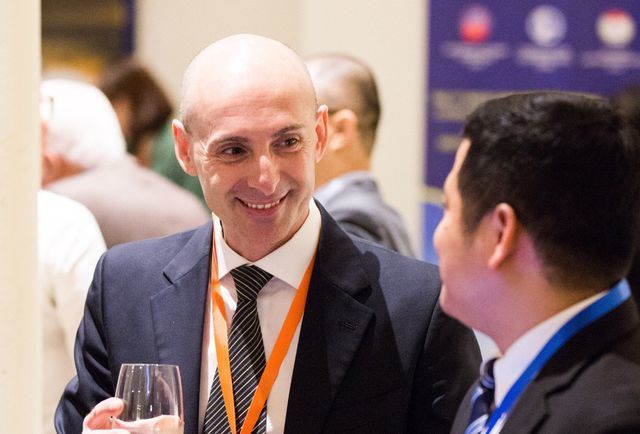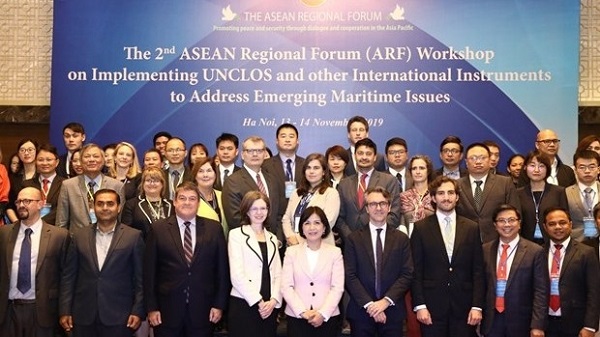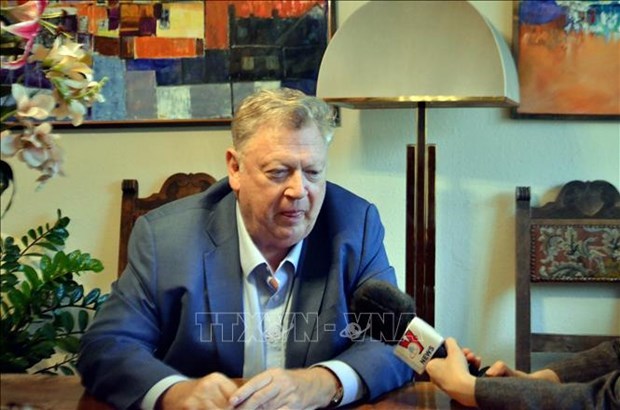 |
|
Dr. Nicola Casarini, Senior Fellow and Head of Asia Research at the Institute of International Affairs attends the 11th East Sea International Conference which opened in Hanoi on November 6
|
Nicola Casarini, Senior Fellow and Head of Asia Research at the Institute of International Affairs (IAI) in Rome told Dantri/DTiNews Newspaper on the sidelines of the 11th East Sea International Conference which opened in Hanoi on November 6 that economic interest was one reason for the EU's rising interest in the East Sea region.
"China is the European Union’s second largest trading partner, and ASEAN is the third. But for ASEAN, the European Union is the second-largest trading partner after China. Because of the great economic interest, Europe and its member states are looking more and more to the East Sea," he explained.
"Another factor, which contributed to Europe’s attention to the area, is the worsening security situation in the region," the expert added.
Nicola Casarini said that Europe has recently stepped up its security presence in the region.
"Traditionally the European Union and its members have contributed to the region security environment in terms of development aid, humanitarian assistance, or by supporting multilateral frameworks and dialogue forums. But in the last three, four years, we have witnessed an increase of EU and its member state involvement in terms of a security and military dimension," he said.
"For example, we have since 2016 seen navy operations undertaken by some EU member states, in particular, France and the UK. But in 2019 this year, we also had some naval assets that were not only French and British but also the Danish, Italians, Portuguese and Germans, which means EU and its member states are for the first time sending naval assets to the region in order to contribute to security and the rules-based order. That reflects the change in attitude and approach that EU and its member states have adopted in the last years."
Asked about pressure from the US on the EU's activities in the East Sea, the expert said that the US does put pressure on Europeans.
"On one hand, Washington puts pressure on its European allies - something which is quite normal. But at the same time, we also have the Europeans themselves understanding that it is time for Europe to step up its security involvement in the region."
Sharing about how EU can contribute to the settlement of disputes in the area, the expert said that one of the biggest contributions could be the trade agreements.
The second contribution in terms of soft power can be development aid and technical assistance. And third is dialogue and exchange of information, expertise and experiences.
"When it comes to the management of fisheries, or marine resources, we have in Europe a lot of experience in management and sharing resources in the Mediterranean Sea," he explained.
"And this could be discussed with ASEAN to see what could be the best practices that could be useful for the East Sea."
The expert hailed the recent signing of a framework agreement between Vietnam and the EU whereby Vietnam will participate in future crisis management and civilian mission operations undertaken by the EU.
"Vietnam is paving the way because it is the first member of ASEAN to have signed this document, and hopefully other Southeast Asian nations will follow. And once we have all the ASEAN members and EU doing this, I think this will be a very concrete contribution, because at that point, you will have not only more dialogue but the more exchange between security and military personnel between EU and the Southeast Asian nations. And it will be in my opinion a very important contribution to addressing the disputes from a civilian standpoint. EU operations are crisis management, they are a civilian operation, even though they are carried out by military personnel," he stressed. Dtinews
An Binh

World experts voice over East Sea issues again
Discussions at the event help address the heat of conflicts which threaten the regional security.

Swiss lawyer emphasises observance of int’l law in East Sea
It is necessary to maintain and respect international law, especially the 1982 UN Convention on the Law of the Sea (UNCLOS), in the settlement of disputes in the East Sea, Swiss lawyer Pierre Schifferli has said.
 Growing economic interest in the East Sea has led the European Union and its member states to pay more attention to the region, according to an Italian expert.
Growing economic interest in the East Sea has led the European Union and its member states to pay more attention to the region, according to an Italian expert.